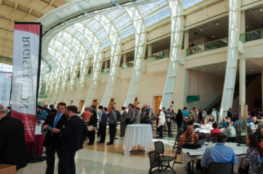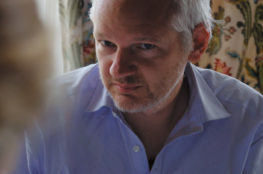He Will Not Divide Us (HWNDU), the unity-art project spearheaded in part by the habitually underwhelming actor Shia LaBeuof, is paying some of the best comedic dividends of 2017. Launched on January 20, HWNDU is a live stream camera positioned outside of the Museum of Moving Image in New York; visitors are encouraged to chant, “He will not divide us!” repeatedly for the next four years in response to Donald Trump’s Presidency. Not surprisingly, it didn’t take long for Internet trolls over at 4chan and other online forums to begin popping up on the feed, spouting everything from white-supremacist rhetoric to calls to retake Constantinople from the Turks. LaBeuof even managed to get himself arrested for assaulting a man live on camera that he believed was a Trump supporter. For an insomniac such as myself, the feed has been a beloved source of entertainment over the past few days, particularly after 1am EST when the trolls really start to come out. Granted, I would not call their behavior edifying, but the entire project — which is childish, vain, and, ironically enough, divisive to the core — was just asking for something like this to happen. And though HWNDU supporters are calling the trolls “neo-Nazis” despite the fact many of them appear to be either Asian or Hispanic, it stands to reason that most just see this as a splendid opportunity for 15 minutes of Internet fame. In this day and age, what more can anyone ask for?
For those who care, I have not given up on my “A Year of 100 Books” project; I just haven’t had time to post updates lately. After my bout with Eire’s Reformations, I am giving myself the grace to take my foot off the pedal for a bit. The problem now confronting me is what to read. Several times now I have found myself staring at my bookshelves (and mountains of books stacked up around my shelves) wondering what I ought to tackle next. Part of me wants to avoid thematic reading, but that’s hard to avoid. There isn’t a single book to be read which doesn’t call to mind a half-dozen more that I should get around to. I had thought of scribbling down 25-30 titles, placing them into a hat, and pulling from there. Knowing my luck, however, every tome I selected would be lengthy and, really, it would take me weeks to settle on a list of candidates. Better to just look-and-grab for now.
“Are you ever going to do anything in aviation law again?” An acquaintance asked me this question the other week. I quickly replied, “No . . . well . . . maybe?” It has been over two years since Cambridge University Press published my book, The Principles and Practice of International Aviation Law, and I have had little desire to pen another word about it outside of a few random blog posts and a contribution to The National Interest. Whenever I take a glance at aviation legal scholarship, I find myself feeling much like I did when I started writing my book: underwhelmed. Though certain aviation-law aficionados took umbrage with my claim that the aviation law field is woefully under-theorized and most aviation scholarship remains unimpressive, no one has actively tried to overturn either thesis. They would prefer to leave the nasty truth alone rathe than confront it head on. After all, there are careers at stake, and if those outside of the narrow circle of aviation-law scholars knew the truth about the banality of the field, they may opt to either overtake it or perhaps even bury it. So it goes. Despite my initial protestations to the contrary, there is a part of me that feels I will go to the grave believing that aviation law, as a particular subject of study, is as absurd as the “law of the horse” that Judge Frank Easterbrook mocked so many years ago.
Part of me feels like I should say something about the ongoing Knights of Malta/Pope Francis debacle. I will limit myself to this observation. The alleged usurpation of the largely symbolic Military Order of Malta’s sovereignty by the Pope pales in comparison to the usurpation of authority the sui iuris Eastern Catholic churches have endured at the hands of the Pope and other Roman authorities for centuries. Thankfully, after more than a century of calls for the Eastern churches to effectively be themselves by governing themselves from top to bottom, things have started to change, though there is still a great deal of work to do. Latin Catholics who are concerned about the Pope meddling in the affairs of his own particular church should be doubly, even triply, critical when the Pope wandering into the jurisdictional space of other churches. It rarely causes anything but trouble. Maybe when some Eastern patriarch or another starts issuing highly ambiguous exhortations that appear to give his clerics license to commune those living in objective mortal sin, it will be necessary — following an appeal — for the successor to St. Peter to step in lest scandal and schism break loose throughout the Mystical Body of Christ. Let us pray such a day never comes.



January 30, 2017
Gabriel, in my ignorance, may I ask if you have looked into the later writings of Carl Schmitt to see if there may be possible analogies to be made in aviation law? I hasten to add that I have not really read the later Schmitt stuff and am certainly ignorant of aviation law, but wondered nonetheless. Best as always.
January 30, 2017
Actually, I used some of Schmitt’s writings on the concept of piracy and some observations he made in The Nomos of the Earth in my aviation law book. Schmitt was quite critical of extending the definition of piracy, as I suspect he would be critical of conflating piracy with terrorism (which some international-law scholars have and continue to push for).
January 31, 2017
Then there is Schmitt’s book on the partisan to look at as well. I have them, just not yet the time to read them.